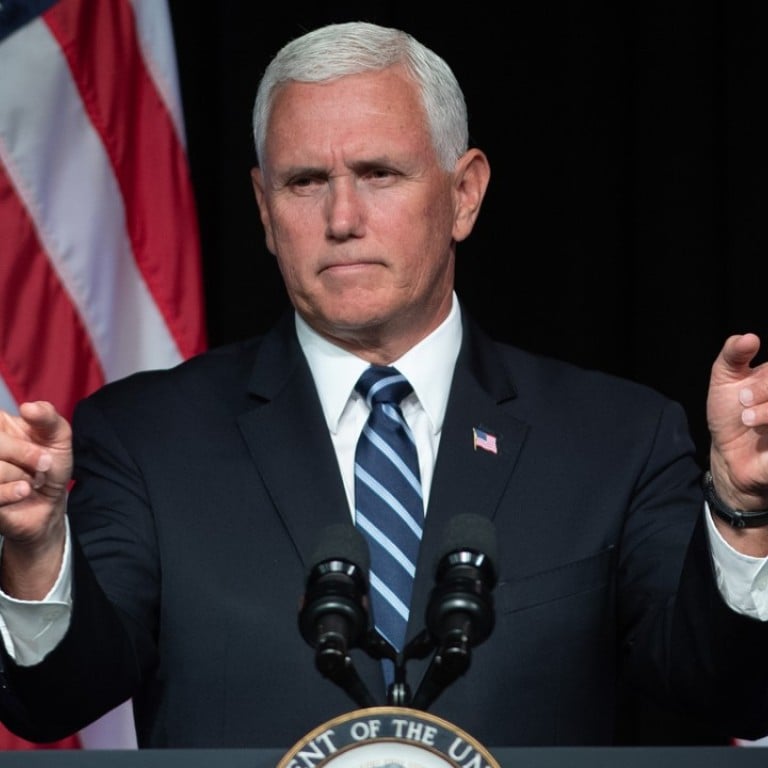
US Vice-President Mike Pence steps up attacks on China by backing Donald Trump’s claim it’s trying to sabotage elections
The vice-president‘s claim Beijing is trying to undermine America’s ‘most cherished ideals’ comes three months into trade war
US Vice-President Mike Pence accused Beijing of using every tool at its disposal to undermine the US political system and warned American companies, including tech giant Alphabet, which owns Google, to disengage from China until the country stops actions aimed at undermining the US’s “most cherished ideals”.
In a wide-ranging speech delivered on Thursday at the Washington-based Hudson Institute, Pence renewed claims by US President Donald Trump that China was seeking to interfere in the upcoming US midterm elections.
“As President Trump said just last week, we have found that China has been attempting to interfere in our upcoming 2018 elections,” he said.
“Our intelligence community says that China is targeting US state and local governments and officials to exploit any divisions between federal and local levels on policy.”
“What the Russians are doing pales in comparison to what China is doing across this country,” he added.
“As we speak, Beijing is employing a whole-of-government approach, using political, economic and military tools, as well as propaganda, to advance its influence and benefit its interests in the United States,” Pence said.
He used as an example of this interference a four-page advertisement that the state-owned China Daily newspaper placed in the Des Moines Register, criticising Trump’s trade policies.
For a time, Beijing inched toward greater liberty and respect for human rights. But in recent years, it has taken a sharp U-turn toward control and oppression
Pence also used the speech to ramp up criticism of Beijing’s militarisation of the South China Sea; the tightening of religious freedoms for the country’s Muslims, Christians and Buddhists; and practices such as forced technology transfer that have fuelled the spiralling trade war initiated by the US.
“For a time, Beijing inched toward greater liberty and respect for human rights,” said Pence, who began his speech recounting a list of positive historical milestones in the US-China relationship. “But in recent years, it has taken a sharp U-turn toward control and oppression.”
The speech was a “a declaration of a comprehensively adversarial relationship with China”, said Robert Daly, Director of the Kissinger Institute on the United States and China at the Wilson Centre.
“I know of no historical precedent for declaring a strategic disposition in quite this way,” said Daly, adding that Pence’s remarks had “immediate and potentially major consequences for every sphere of US-China interaction: corporate, academic, strategic.”
Hours after Pence delivered his speech, Chinese foreign ministry spokeswoman Hua Chunying said in a statement published to the ministry’s website that China “resolutely rejected” Pence’s accusations of Chinese interference in US elections, calling them “groundless speculation”.
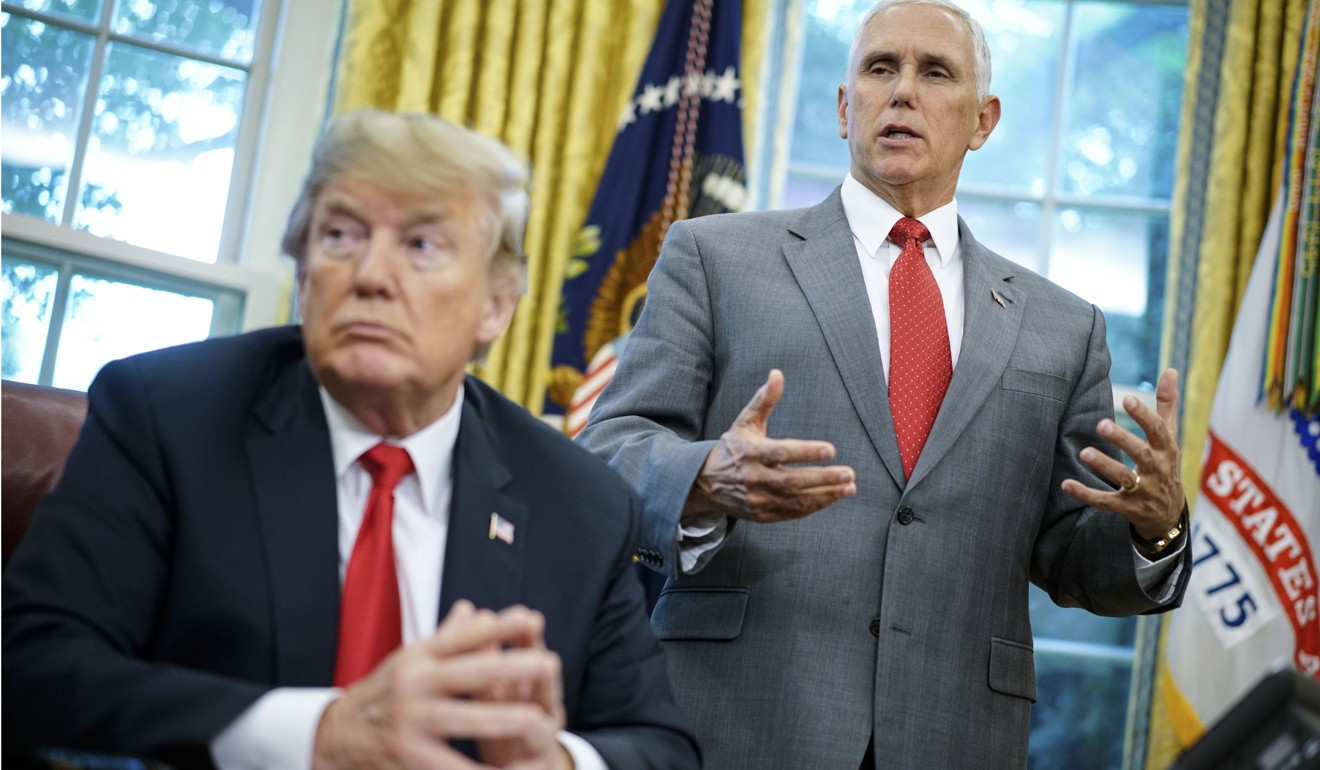
“No-one can stop the Chinese people as they walk unwaveringly along the path of socialism with Chinese characteristics, on their way to even greater achievements,” Hua said. She also rejected Pence’s claim that the US had “rebuilt China” over the last 25 years through its large trade deficit, stating that China’s development “was not at all thanks to the charity and gifts of others”.
Google should immediately end development of the Dragonfly app that will strengthen the Communist Party’s censorship
“We are committed to working hard alongside the US to accomplish win-win cooperation that is non-confrontational and mutually respectful,” Hua said. “We encourage the US to correct its mistakes, cease its groundless criticism and slander of China, and cease damaging China’s interests and US-China relations.”
The vice-president’s remarks came almost three months into his administration’s trade war with Beijing, opening up the rift further on more fronts.
Pence singled out Alphabet’s Google division for its controversial re-entry into the Chinese market with a search engine specially designed for the country, calling into question the pursuit of profits by US companies in the world’s second-largest economy.
Code-named “Dragonfly”, the modified search app will blacklist sites on human rights, democracy, religion and other issues deemed sensitive by the Chinese government and is now awaiting Beijing’s approval, according to news site The Intercept.
“More business leaders … are thinking twice before diving into the Chinese market if it means turning over their intellectual property or abetting Beijing’s oppression, but more must follow suit,” the US vice-president said.
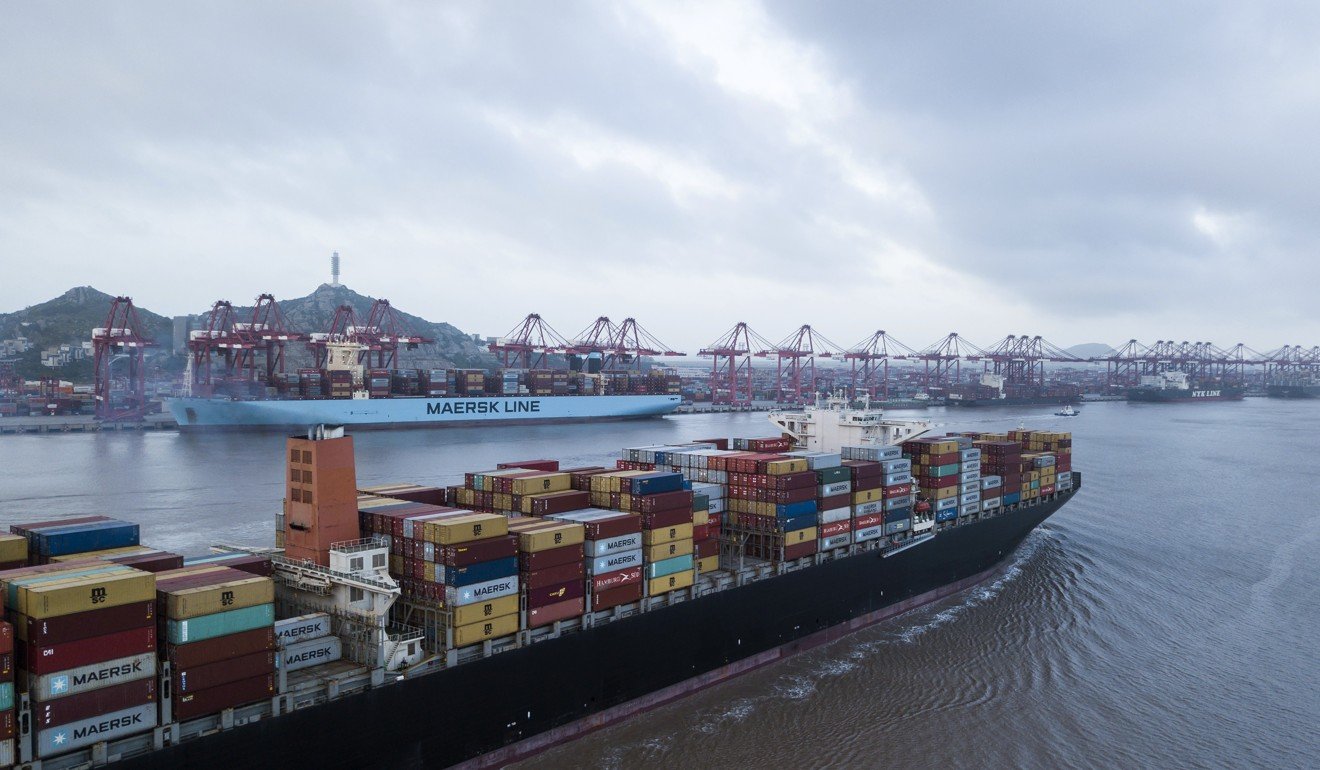
“For example, Google should immediately end development of the Dragonfly app that will strengthen the Communist Party’s censorship and compromise the privacy of Chinese customers.”
The issue of Chinese buyers importing US technology to use it in surveillance and other security applications has come under further scrutiny recently, amid increasing attention on the Chinese government’s crackdown on Muslims living in the far west region of Xinjiang.
Between hundreds of thousands and one million Uygurs and other largely Muslim ethnic groups are reported to be detained in mass internment camps and subjected to enforced reeducation.
“Survivors of the camps have described their experiences as a deliberate attempt by Beijing to strangle Uygur culture and stamp out the Muslim faith,” said Pence on Thursday, becoming the highest-ranking US official to speak out publicly on the crackdown in Xinjiang, a sign the matter is garnering more attention within the Trump administration.
Sam Brownback, the administration’s ambassador-at-large for international religious freedom, said on Wednesday the crackdown on Uygurs in Xinjiang was “the most concerning religious situation in the world today”.
Brownback said at an event at Westminster Institute that he hoped his administration would take “aggressive action” that other countries would support. “We'll keep working and pushing for it,” he said.
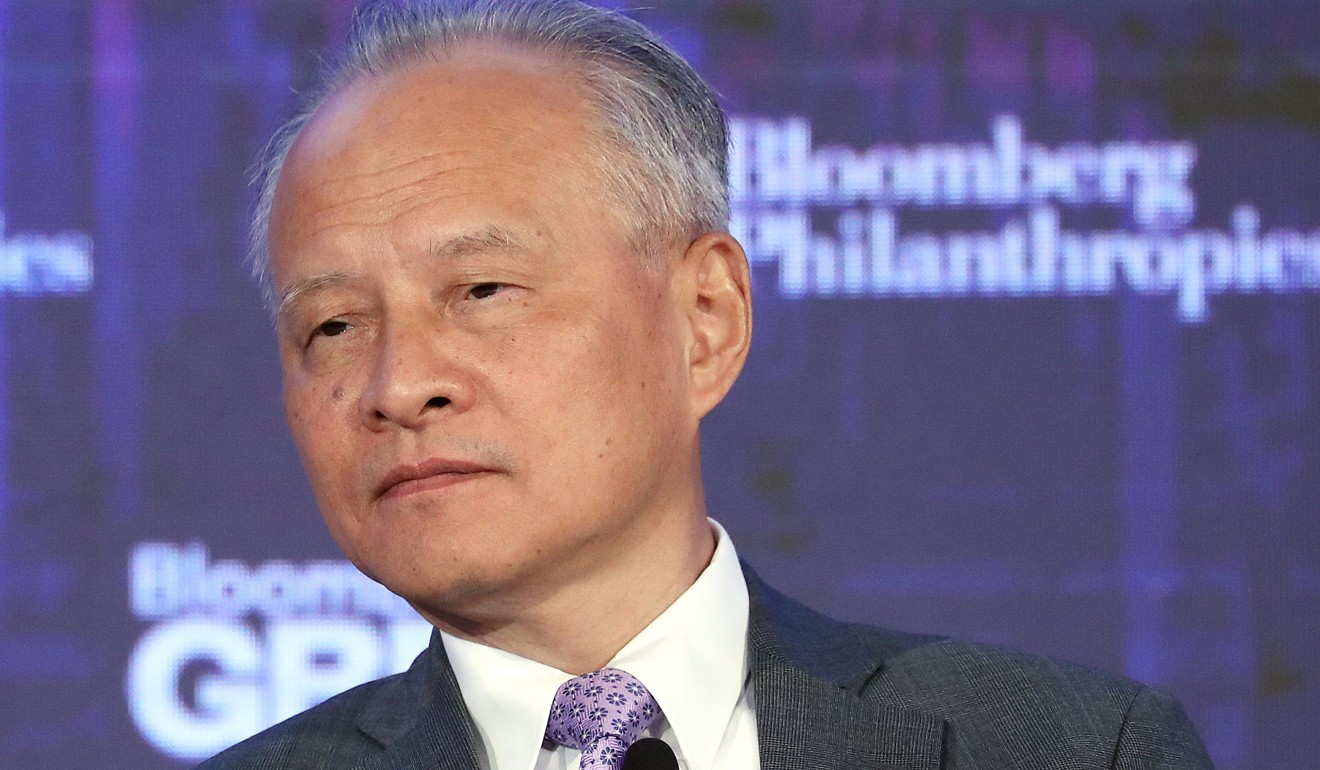
Pence also used his speech to train the spotlight on the ongoing trade war between the US and China. Major issues in the trade dispute are the US government’s complaint that China forces US firms to share proprietary technology with joint venture partners in exchange for market access, and the administration’s concern about the US’s trade deficit with China.
Washington has imposed multiple rounds of tariffs on US$250 billion of the more than US$500 billion of all Chinese goods entering the US; Beijing has responded in kind with tariffs of its own on goods coming into China.
In a statement on Twitter, US Secretary of Commerce Wilbur Ross applauded Pence for his “powerful speech” about China’s aggressive trade practices, and said he was proud to be part of the Trump administration’s effort “to provide a level playing field for [American workers] and businesses”.
Not everyone agreed that Pence’s speech was constructive.
Pence identified “a number of actual problems that the United States confronts in its relationship with China, but his dramatic rhetoric and some weakly supported assertions threaten to undermine his message,” said Elizabeth Economy, director for Asia studies at the New York-based Council on Foreign Relations.
“China putting an insert in a Midwest newspaper is not ‘meddling’ in the US election. ... Suggesting that what Russia has done to undermine our political process pales in comparison to what China is doing demands evidence, which he does not provide.”
Multiple attempts to resolve the dispute through negotiations have failed, with the US side accusing Beijing of refusing to bring any substantive concessions to the table.
The Chinese side has complained that a lack of clarity about Washington’s stance has foiled attempts at progress.
“The US position keeps changing all the time, so we don't know exactly what the US would want as priorities,” China’s ambassador to the US, Cui Tiankai, recently told NPR.
Accusing the Trump administration of pursuing a deal that would have only two possible outcomes, where “the US will get 100 per cent and China will get zero”, Cui said, “We are ready to make a deal.”
“We are ready to make some compromise,” the ambassador said, “but it needs the goodwill from both sides.”
The most recent attempt to achieve compromise came in late September when the US proposed high-level talks between Vice-Premier Liu He and US Treasury Secretary Steven Mnuchin, an invitation that Beijing welcomed.
The plan fell through at the eleventh hour, however, when the US slapped 10 per cent tariffs on US$200 billion of Chinese goods, prompting Beijing to pull out.
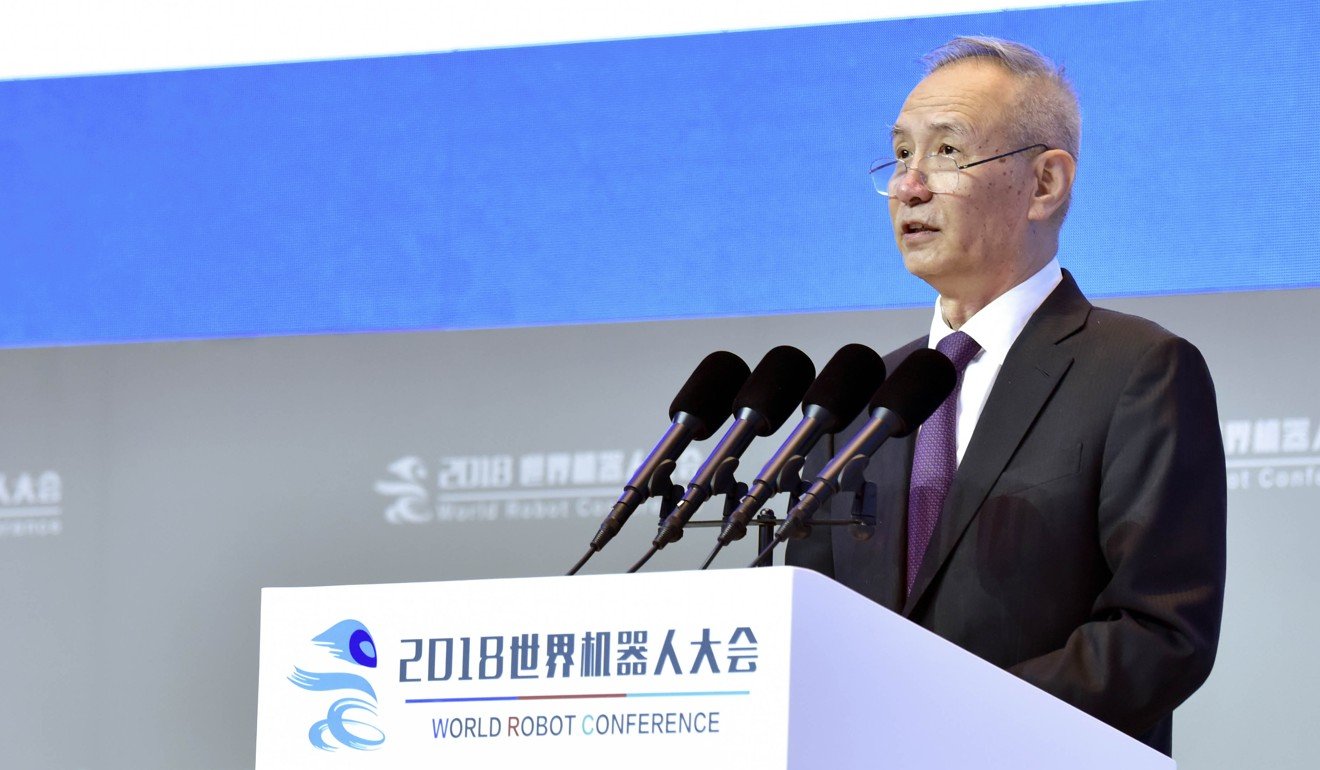
Trump, who said on Monday that now was not the right time to talk to China, has threatened multiple times to take the unprecedented step of putting tariffs on all Chinese imports.
There has been no sign that the office of the US Trade Representative is considering such action, despite Trump’s unequivocal vow to make good on his threat if Beijing retaliated against his administration’s most recent round of tariffs.
Beijing did retaliate, with duties of its own on US$60 billion of American goods.
Beyond tariffs, trade war tensions have begun to surface on multiple, non-trade fronts.
Military tensions spiked recently when the US imposed unprecedented sanctions on a Chinese state military firm after it procured arms, including fighter jets, from a US-blacklisted Russian defence entity. Beijing responded by cancelling a US navy ship’s requested port call to Hong Kong.
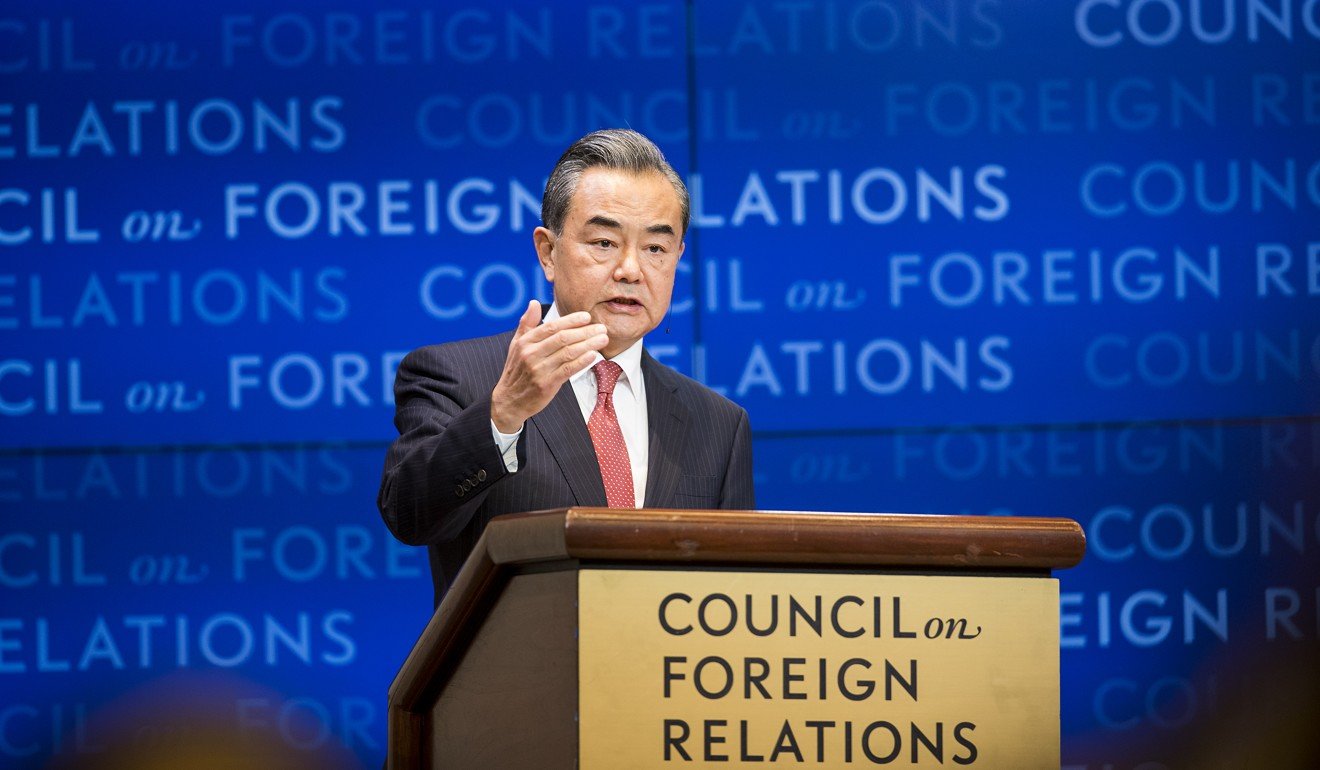
And the tensions could get worse next month if the US goes through with plans to carry out a week of intensive naval drills near Chinese-claimed waters in the South China Sea as a show of force to Beijing.
First reported by CNN, the plans, still under consideration, would involve aeroplanes and ships passing close to Chinese forces – a scenario certain to provoke a stiff reaction from the Chinese government.
Referring to a close encounter earlier this week when a Chinese destroyer nearly collided with a US Navy ship near the China-claimed Gaven Reef, Pence said: “The United States Navy will continue to fly, sail and operate wherever international law allows and our national interests demand.
“We will not be intimidated; we will not stand down.”
Pence’s remarks on Thursday came a week after China’s top diplomat, Wang Yi, issued a strongly-worded warning to the US.

Speaking at the New York-based Council on Foreign Relations, State Councillor and foreign minister Wang Yi said suspicions surrounding China’s global ambitions would end up hurting the US’s own interests.
Warning that the US-China relationship was precariously close to suffering irreparable damage because of sentiment in Washington that China was seeking global domination, Wang said it was natural that tensions would arise between two countries with such different cultures and histories.
“What is important is how [those differences] are viewed, evaluated and handled,” said Wang.
The Wilson Centre’s Daly said that substantive proposals for resolving such differences were missing from Pence’s Thursday speech.
“It was a good list of our grievances to date, but it was not a road map for US-China policy going forward,” said Daly. “That remains to be done.”
Additional reporting by Jun Mai


